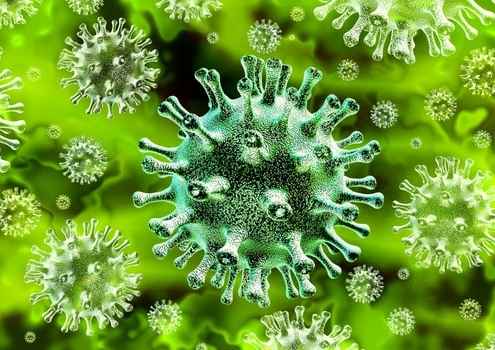Veru’s Compound Shows Promise as Antiviral/Anti-Inflammatory Therapeutic for Covid-19
Veru’s Compound Shows Promise as Antiviral/Anti-Inflammatory Therapeutic for COVID-19
Veru Inc. is developing a dual anti-inflammatory/antiviral medication to combat severe COVID-19 infections. Originally designed to disrupt cell signaling in a variety of cancers, the compound uses that same mechanism of action to dampen the cytokine storm that leads to severe acute respiratory distress syndrome (SARDS) in the most serious cases of COVID-19.
The oral drug, VERU-111, is in Phase II trials and just completed an in vitro study confirming its anti-inflammatory properties, conducted by researchers at the University of Tennessee. This positions it as probably the only dual-action compound in development to treat COVID-19.
“Viruses are macromolecules. To block replication, you have to hijack the cell replication machinery. Otherwise, the virus enters the cells, hops onto the microtubules which, like a taxicab, bring the viral RNA to the nucleus for replication, where the virions assemble into new virus particles, which hop back to the microtubules to exit the cell,” Mitchell Steiner, M.D., CEO, told BioSpace. That mechanism of action is well known. “What’s new is that we have a more potent, safer molecule.”
“VERU-111 targets microtubules – the transportation system within the cell,” Steiner said.
It is a small molecule drug that is derived from colchicine, “an old drug that treats gout by disrupting the microtubules,” and, therefore, the cell replication machinery.
When VERU-111 is administered, it blocks antigen receptors’ ability to be transported into the nucleus of a cell for replication and out again. More specifically, VERU-111 binds to the same binding site as the drug colchicine and inhibits tubulin polymerization at low nanomolar concentrations, thus affecting cell migration, cytokine release and intracellular trafficking, and disrupting inflammatory cell activities.
“Both COVID-19 and cancer – Veru’s primary area of focus – have that transport system in common,” Steiner said. “We’ve been using it against prostate cancer and are seeing good safety and activity.”
The Phase I prostate cancer trial was recently completed, and the Phase II trial is scheduled for completion Q4 2020. A Phase III registration trial is planned for Q1 2021 for that indication.
When COVID-19 emerged, Veru’s prostate work was well underway. Based on what the team knew of the drug’s mechanism of action and of COVID-19, Veru researchers suspected VERU-111 could be an effective anti-inflammatory to moderate the cytokine storm that manifests in severe cases of COVID-19.
The just-completed in vitro study conducted by researchers at the University of Tennessee confirmed that supposition.
That study found that VERU-111 is comparable to or better than the steroid dexamethasone, which “decreases inflammation, but has no antiviral activity,” Steiner said. “Dexamethasone reduces mortality in COVID-19 and works by decreasing the cytokine storm.” But, it lacks anti-viral activity.
In the study, UT researchers took a mouse spleen and shocked it with endotoxin to create a cytokine storm. Then they treated the tissue using the same VERU-111 concentrations that would be used in humans, and measured the drug’s anti-inflammatory activity.
“They found concentrations of IL-1 were reduced by 123%, IL-6 by 85% and IL-8 by 96%. These are the key cytokines involved in the cytokine storms triggered by severe SARS-CoV-2 infections in humans,” he pointed out. “A reduction of 100% means the level is back to normal, so this was pretty exciting. It gave us more confidence that the ongoing Phase II study should be promising.”
“The Phase II study for COVID-19 started about two months ago, before the UT study,” Steiner said. “The pharmacologic rational was so compelling that the compound should be antiviral and anti-inflammatory, that we were compelled to find out.”
In the ongoing Phase II trial for COVID-19, patients are given one 18 mg pill daily for 21 days. “At day 29, we look at VERU-111’s effect on COVID-19. Our primary endpoints are the number of patients who are off ventilators and are alive.”
Because the Phase II trial in COVID-19 is double-blind placebo controlled, Steiner has no intermediate data to share.
“We are still enrolling patients who are at risk of developing SARDS and have enrolled one patient in the ICU,” Steiner said. “Hopefully, we will have results available in the fourth quarter of this year.”
VERU-111 appears safe. Two prostate cancer trials have treated 79 men using much higher doses than those used to treat COVID-19.
“At the dose we use for cancer, the drug appears well-tolerated. Some patients have been taking it daily for more than a year,” Steiner said. “There has been no neurotoxicity or neutropenia, although some patients have reported nausea, vomiting and grade 1 or 2 diarrhea.”
Participants in the Phase II monotherapy trial are pre-chemotherapy patients with metastatic castration and androgen receptor targeting agent resistant prostate cancer.
The next milestone for VERU-111 in relation to COVID-19 is getting Phase II data. That data will determine the endpoints for a Phase III trial to determine where the drug may be most beneficial. Possible examples include taking patients off respirators earlier, prolonging survival, or being discharged sooner from the hospital.
Although Veru is focused on prostate cancer and oncology, Steiner said the company felt morally compelled to answer the call of duty to alleviate the severe symptoms associated with this urgent, global pandemic.
BioSpace source:



